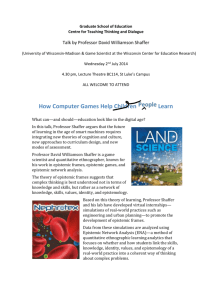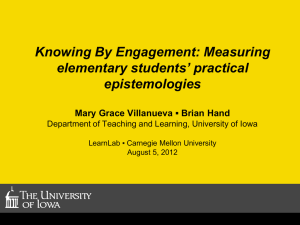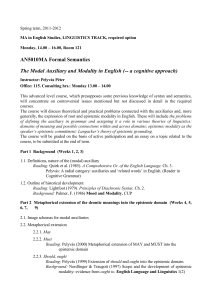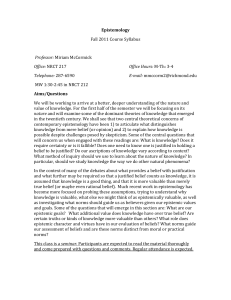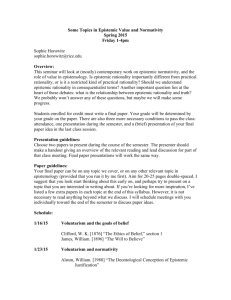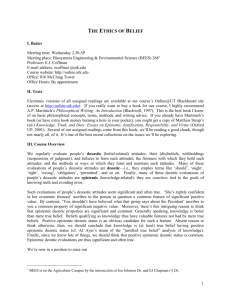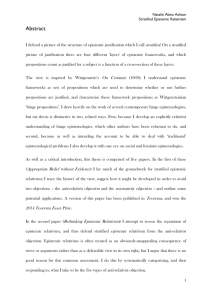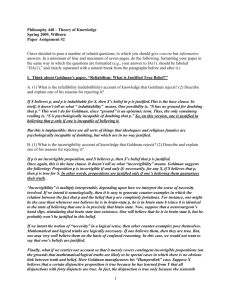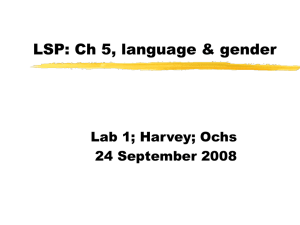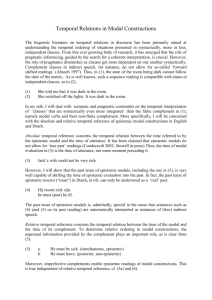Ari Society Handout - Backdoor Broadcasting Company
advertisement
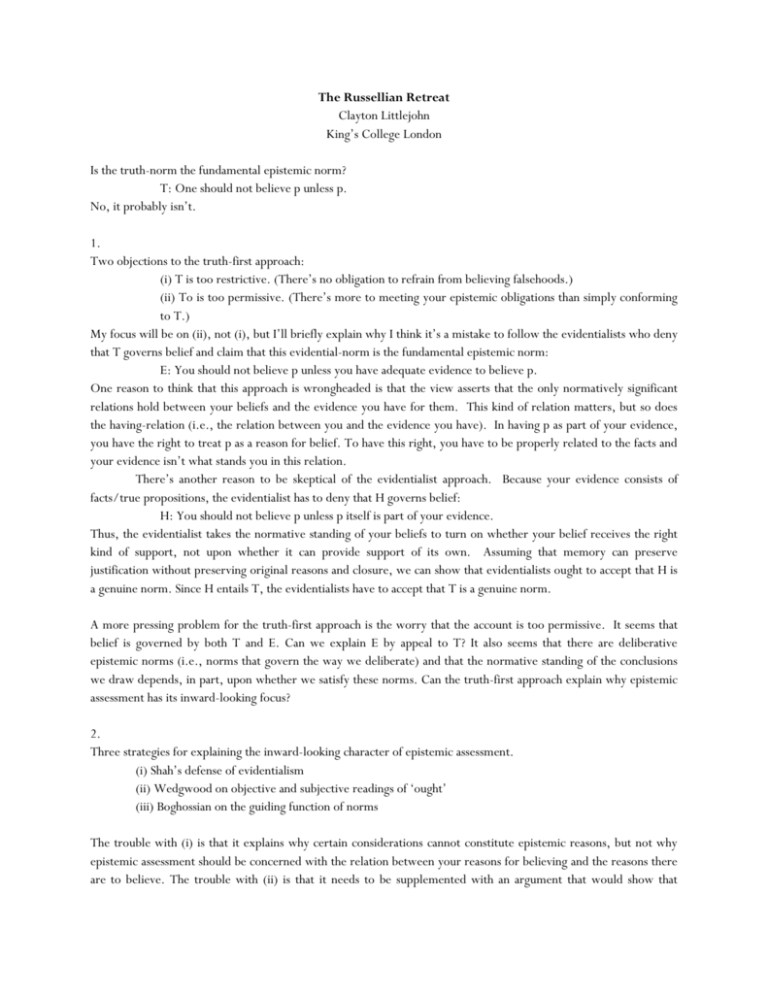
The Russellian Retreat Clayton Littlejohn King’s College London Is the truth-norm the fundamental epistemic norm? T: One should not believe p unless p. No, it probably isn’t. 1. Two objections to the truth-first approach: (i) T is too restrictive. (There’s no obligation to refrain from believing falsehoods.) (ii) To is too permissive. (There’s more to meeting your epistemic obligations than simply conforming to T.) My focus will be on (ii), not (i), but I’ll briefly explain why I think it’s a mistake to follow the evidentialists who deny that T governs belief and claim that this evidential-norm is the fundamental epistemic norm: E: You should not believe p unless you have adequate evidence to believe p. One reason to think that this approach is wrongheaded is that the view asserts that the only normatively significant relations hold between your beliefs and the evidence you have for them. This kind of relation matters, but so does the having-relation (i.e., the relation between you and the evidence you have). In having p as part of your evidence, you have the right to treat p as a reason for belief. To have this right, you have to be properly related to the facts and your evidence isn’t what stands you in this relation. There’s another reason to be skeptical of the evidentialist approach. Because your evidence consists of facts/true propositions, the evidentialist has to deny that H governs belief: H: You should not believe p unless p itself is part of your evidence. Thus, the evidentialist takes the normative standing of your beliefs to turn on whether your belief receives the right kind of support, not upon whether it can provide support of its own. Assuming that memory can preserve justification without preserving original reasons and closure, we can show that evidentialists ought to accept that H is a genuine norm. Since H entails T, the evidentialists have to accept that T is a genuine norm. A more pressing problem for the truth-first approach is the worry that the account is too permissive. It seems that belief is governed by both T and E. Can we explain E by appeal to T? It also seems that there are deliberative epistemic norms (i.e., norms that govern the way we deliberate) and that the normative standing of the conclusions we draw depends, in part, upon whether we satisfy these norms. Can the truth-first approach explain why epistemic assessment has its inward-looking focus? 2. Three strategies for explaining the inward-looking character of epistemic assessment. (i) Shah’s defense of evidentialism (ii) Wedgwood on objective and subjective readings of ‘ought’ (iii) Boghossian on the guiding function of norms The trouble with (i) is that it explains why certain considerations cannot constitute epistemic reasons, but not why epistemic assessment should be concerned with the relation between your reasons for believing and the reasons there are to believe. The trouble with (ii) is that it needs to be supplemented with an argument that would show that overall obligation depends upon both objective and subjective grounds. If combined with Boghossian’s suggestion that norms have a guiding function and generate derivative norms if they cannot be followed directly, everything seems to hang together quite nicely. 3. Two ways to think about guiding reasons (i.e., the reasons associated with norms that apply to us and demand things from us): (i) Compliance: a reason (typically) demands compliance. To comply with a reason to X, one must X for that reason or out of consideration of that reason. (ii) Conformity: a reason (typically) demands conformity. To conform to a reason to X, one must X. The compliance account is the account that says that guiding reasons are supposed to guide us and that we’re supposed to be guided by them. The conformity account denies this. If the truth-first approach is combined with the compliance account, it seems the resulting account can explain why epistemic assessment is inward-looking. So, if the compliance account is right about what reasons demand from us, this approach to epistemic normativity would seem to be quite promising (in the American sense). Troubles for the compliance account: if the account captures some important insight into the nature of guiding reasons, we should find that the deontic status of both beliefs and actions depends upon the relation between guiding and explanatory reasons. This isn’t what we find. (i) Thomson on the irrelevance of intention (ii) Ross on categoricity and whether one’s duty is to act from the motive of duty (iii) Compliance requires that one is cognizant of a reason and that it’s operative. So, ignorance entails that one does not comply. While a failure to satisfy the demands of a reason is a wrong, ignorance of a reason doesn’t (always) require an excuse. (iv) Overdetermination (v) The facilitating role of reason 4. If the objections in the previous section were sound, there’s an asymmetry between practical and epistemic assessment. Here’s a rough initial statement of the asymmetry: the deontic status of an action doesn’t seem to depend upon explanatory reasons but the deontic status of a belief does. First response: There’s an asymmetry, but that’s just because epistemic reasons are one way and practical reasons are the other. The compliance account is wrong for practical reasons but right for epistemic reasons. My response: There are parallel cases that undermine the compliance account of epistemic reasons. Second response: There’s no asymmetry, but practical assessment is concerned with explanatory reasons. My response: Believing for reasons that aren’t among the good reasons there are to believe is wrongful, but the same cannot be said for acting for reasons that aren’t among the good reasons there are to act. Whereas believing for reasons that only accidentally lead to truth is itself a kind of epistemic wrong, the same cannot be said for acting for reasons that only accidentally bring about conformity. A virtue of a knowledge-first approach is that we can easily explain why E and T govern belief on the assumption that K governs belief: K: You should not believe p unless you know p. On this account, we only need a weak account of reasons (e.g., the conformity account) to account for the asymmetry between practical and epistemic assessment. 5. The knowledge-first approach fits nicely with a natural rationale for thinking that there’s any such thing as the fundamental norm of belief. There are beliefs that do what they’re supposed to and beliefs that cannot do what they’re supposed to. Those that do what they’re supposed to conform to the norms that govern them. What are beliefs supposed to do? Fit the facts? Yes, but is it just that? What beliefs should do is provide us with reasons. Since reasons are facts, the truth-first approach is right to say that false beliefs cannot do what they’re supposed to. The trouble with the truth-first approach is that there are true beliefs that cannot do what beliefs are supposed to do. It’s easy to forget this until we remember that there’s a difference between believing what’s true and being in touch with reality.
